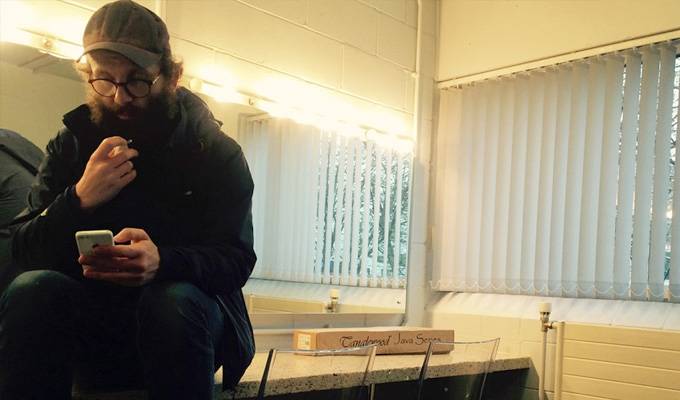
Mouse. The Persistence of an Unlikely Thought
Note: This review is from 2016
First review of Daniel Kitson's new show
Daniel Kitson likes to do everything himself. No agent, no publicist, he even sets out his own stage as the audience file in; filling the set with pot plants, lamps and, centre stage, a desk containing a typewriter.
It represents a large storage unit; the space where his character, William Booth, gets away to write. He has spent 12 years here, agonising over his novel, Mouse – about a woman who believes she can communicate with one of the rodents who infested her house. The only concession to the outside world is a landline, whose number he doesn’t even know. So when it rings one night, it’s a surprise, to say the least.
The voice at the end of the line is Kitson’s. Same accent, same cadences, same testy sarcasm, when needed. Same use of the word ‘mate’, even. The do-it-yourself ethos is clearly being taken to extremes.
As the pair try to suss each other out, the to-and-fro they have and the uncertainty over their respective positions are similar to those in Kitson’s earlier play Tree, where Tim Key was his foil. However the fact the two characters are indistinguishable makes these exchanges more monotone to the earlier piece.
Turns out there’s a reason for the similarities between Booth – whose sharing of a name with the founder of the Salvation Army is purely coincidental – and his mystery caller, Billy Cunningham. Of course there is, no one could accuse Kitson of being sloppy. But their likeness – and the fact that the Mouse storyline which Booth runs through to his new acquaintance is more mundane than a yarn 12 years in the making should be – means you have to put some trust in Kitson that everything will pay off. It’s probably not too much of a spoiler to reveal that it does.
Every so often, he yanks us out of the phone call for a third-party narration that takes us through Booth’s backstory, working against time’s arrow, which primarily allows him to ponder on the nature of friendship. The way a conversation with a complete stranger – like the central phone call – can be liberating, without the burden of shared history or any chance of revelations colouring future relationships. Or the way that friends drift apart, lives once apparently inextricably intertwined become distant. There’s also debate over whether life revolves around big decisions that affect everything in the future – Sliding Doors-style – or just a succession of tiny ones that nudge us along a certain path. And there’s highly original thought about the grip of patriarchy for good measure.
In the narrations, Kitson occasionally allows his theatrical mask to slip: laughing as a dramatic flourish goes awry or berating himself for forgetting a stage direction. It’s refreshing when he does, a reminder of the spontaneous stand-up wit behind the playwright in danger of taking his writing strengths just a bit too seriously. ‘It’s not about what happens,’ Booth says of his grand opus. ‘It’s about why what happens happens.’ And Kitson has a similar outlook to his work.
Indeed, a Kitson gradually introduces the first of several twists in the tale – and even a second voice in Isy Suttie, playing Cunningham’s wife down the line – Mouse turns its attentions away from the philosophising and on to why the strange events in the storage unit might be happening. And although the answer is tantalisingly inconclusive, the increasing plot pirouettes add crucial intrigue to the dialogue.
The biggest surprise, though, for those used to Kitson selling out in minutes, is why the Liverpool Everyman was only half-full last night; a clash with Liverpool FC’s Europa League showdown with Sevilla notwithstanding.
Review date: 19 May 2016
Reviewed by: Steve Bennett
Reviewed at:
Liverpool Everyman






